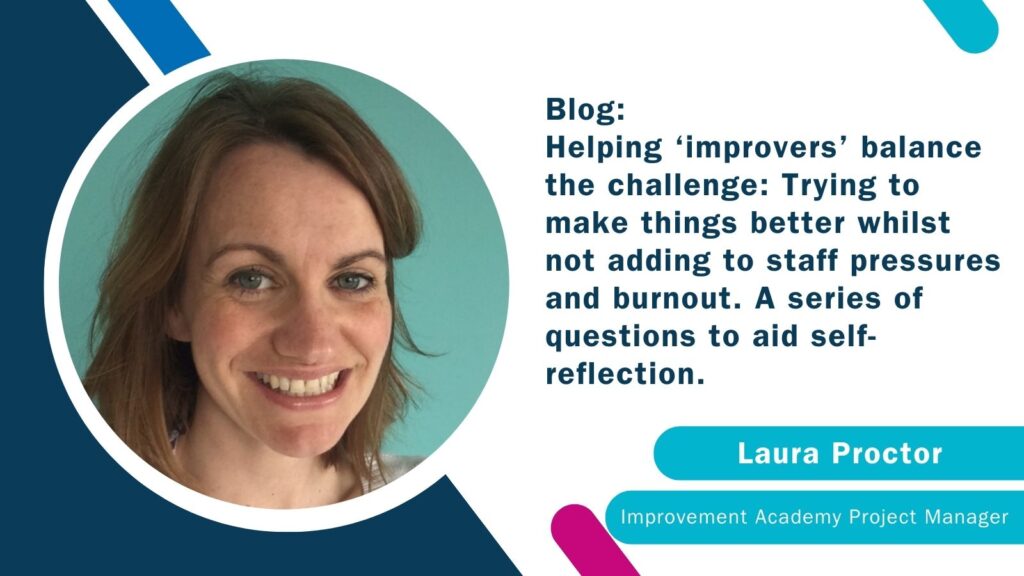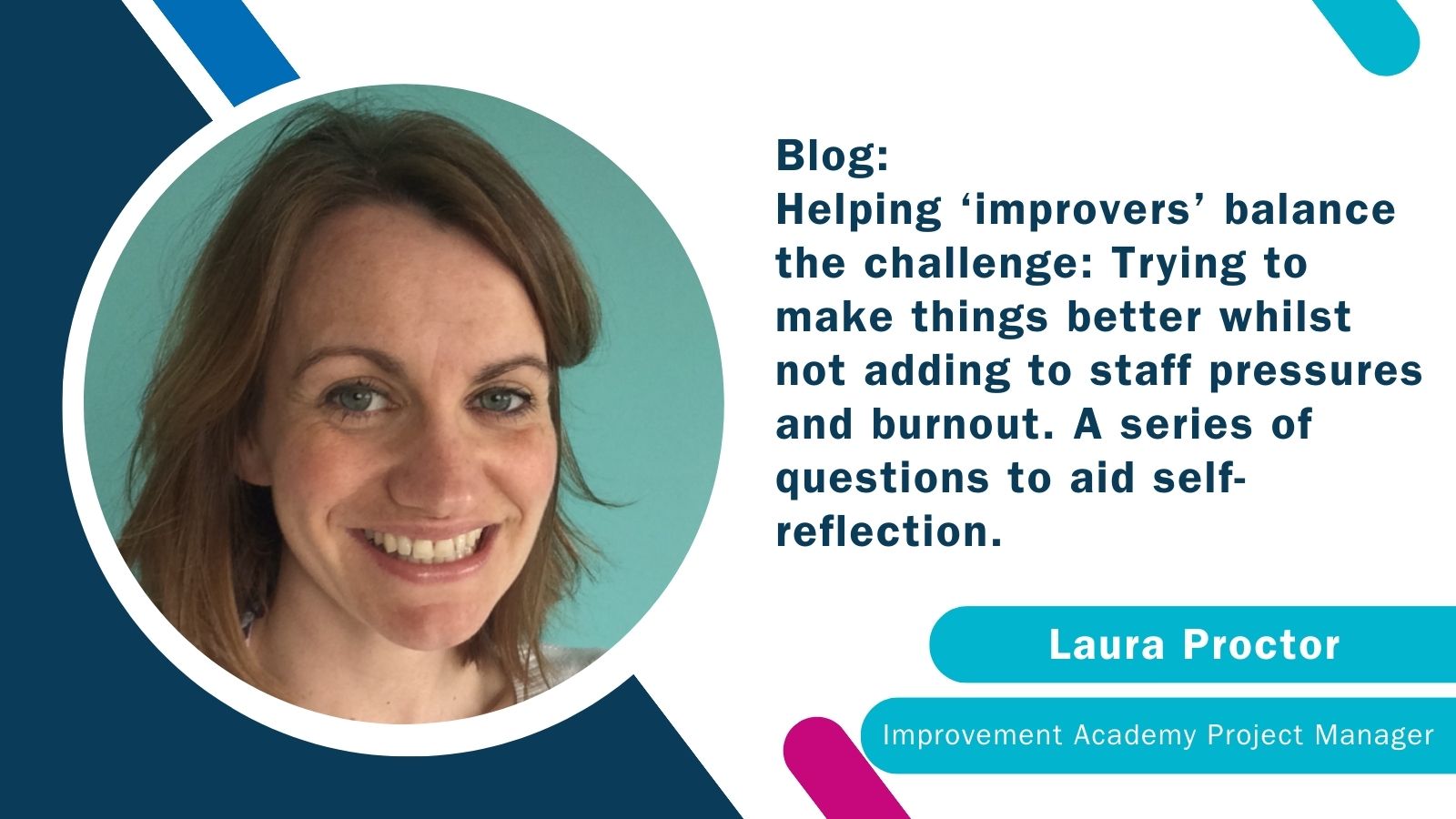
Helping ‘improvers’ balance the challenge of making things better whilst not adding to staff pressures and burnout: a series of questions to aid self-reflection.
The NHS pressure cooker dial is still set to high, and working life for those on health and care frontlines continues to be an act of human endurance. The podcast ’You are not a Frog’ hosted by Dr Rachel Morris draws a comparison between NHS frontline staff in high pressure environments and a frog sitting in a pan of boiling water. The frog has two choices: to stay and be boiled alive or jump out of the pan! The listener is reminded that other options do exist and are worth exploring because, well, you are not a frog and you don’t need to suffer! You Are Not a Frog: Podcast for Doctors.
Published data and anecdotal evidence strongly indicates that some staff are opting to jump out of the pan as the workforce crisis ensues (Nuffield, 2023). Data based on around 50 NHS Trusts suggest that in May 2021, an estimated four in five registered nurse vacancies and seven in eight doctor vacancies were being filled by temporary staff, either through an agency or using their ‘bank’. In turn those who remain in work bear the brunt of reduced staffing levels and consequently, staff tensions increase. This can contribute to dysfunctional, fragmented teams, and staff impacts including anxiety; stress; depression; and other psychiatric illnesses; incidentally, the most common reasons for absenteeism. (Nuffield 2023).
I’ve often heard it said by those in senior positions that “staff are our most important asset”. Kline 2019, expands on this to demonstrate that, “How staff are treated significantly influences care provision and organisational performance, so understanding how leaders can help ensure staff are cared for, valued, supported, and respected is important”. In terms of quality improvement, the detrimental impact of clinician burnout on patient safety is also well-documented (Hall et al., 2016). Against the backdrop of the mass exodus from the NHS, it seems something of a puzzle to me. If staff are our most important asset, why does their experience suggest otherwise?
Back to the question in hand: ‘how do we as improvers ensure that we are not inadvertently contributing to staff’s stressors and pressures?’ I wonder what other options, instead of being a frog, was Dr Rachel Morris alluding to, and how can we as healthcare improvers support people to tap into them?
I believe support for frontline staff, starts by adopting the observations made by Dr Maria Kordowicz, Chartered Psychologist, Senior Lecturer in Business Psychology and Q member. Dr Kordowicz makes: “The Case for Relational Quality Improvement in Healthcare”, that, due to its systematic process-driven nature, quality improvement can result in a prolific focus on ‘quality’ metrics and standardised processes. This focus can at times detract from recognising the important and effective role human relationships play in implementing and sustaining change in healthcare.
Interestingly Mandel and Cady, 2021, also raise concern about the effectiveness of Healthcare QI when organisational performance is prioritised over staff participants’ emotional experience, with, failure to do so having real consequences. The American systems scientist Peter Senge, correlates participants eroding emotional energy, waning engagement and burnout with pushing harder on the process technical side of quality improvement. As improvers we clearly want to mitigate against these risks, to generate a new enthusiasm, confidence, and belief that improvement in healthcare is possible.
To help ensure we are upholding and helping frontline staff in improvement initiatives, I have drawn on evidence by Kline, 2019, Mandel and Cady 2021, Edmondson A, 1999, Cable, 2018 to create a series of self-monitoring ‘AM I..?’ questions.. I propose that these could be used by us as improvers in health and social care, to regularly reflect on our own practice:
Am I fostering whole team collaboration and inclusion?
• Doing QI with people not to people.
• Helping staff be clear on a common purpose that is meaningful to them.
AM I building trust and commitment from the start?
• Opting to address conflict over the pretence that relationships are ok (false harmony).
• Inviting staff to share their concerns misgivings through honest discussions, as opposed to ‘shutting down’.
AM I listening to and acting on feedback?
• Developing ‘empathic understanding’ – and ‘unconditional positive regard’, no matter what staff want to feedback about their role, or the proposed QI.
• Applying these principles of listening and understanding, in ALL interactions with staff.
AM I building and investing in team relationships?
• Reinvigorating ‘teamness’ by recognising the human need to belong, be listened to, and respected..
• Creating safe spaces that recognise the anxiety people may feel to speak up about concerns for fear of sounding stupid, wrong, or contentious.
AM I considering my own role modelling?
• Seeking to be an inclusive leader, role modelling behaviours and understanding my impact on those around me.
• Adopting the humble mindset of a servant leader, leading as an equal , seeking ideas and unique contributions of others, admitting mistakes, and asking what can I do to help you?
AM I noticing and responding to team well-being?
• Upholding well-being so that staff feel valued and regarded staff as an asset rather than a cost or number, listening to the most junior staff member, engaging in repeated acts of kindness and support.
• Recognising when my plans need to bend in response to staff need and caring for staff as my first ‘do no harm’ principle.
I invite colleagues in health and social care improvement to get in touch and share your experiences of supporting staff in improvement initiatives. Are we as improvers managing to ‘do no harm’, and provide real support to the frontline to improve safe and quality care, through our considered empathetic approach? If so, how? Does this blog resonate with you, spark any other thoughts, ideas or reflections? Please contact me Laura.Proctor@yhia.nhs.uk.
